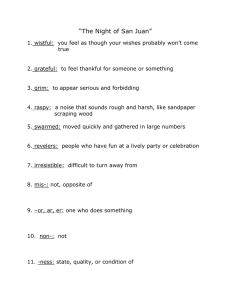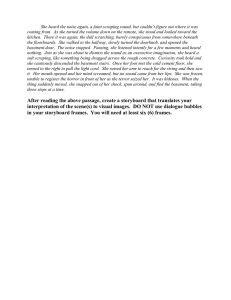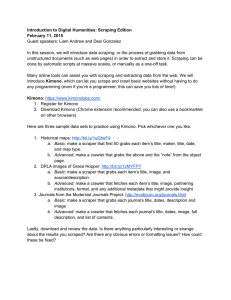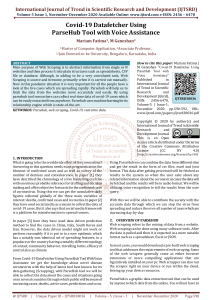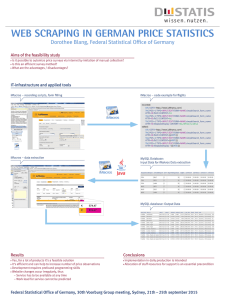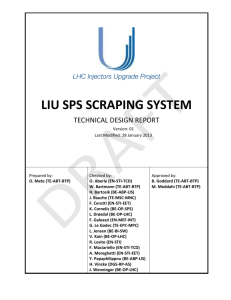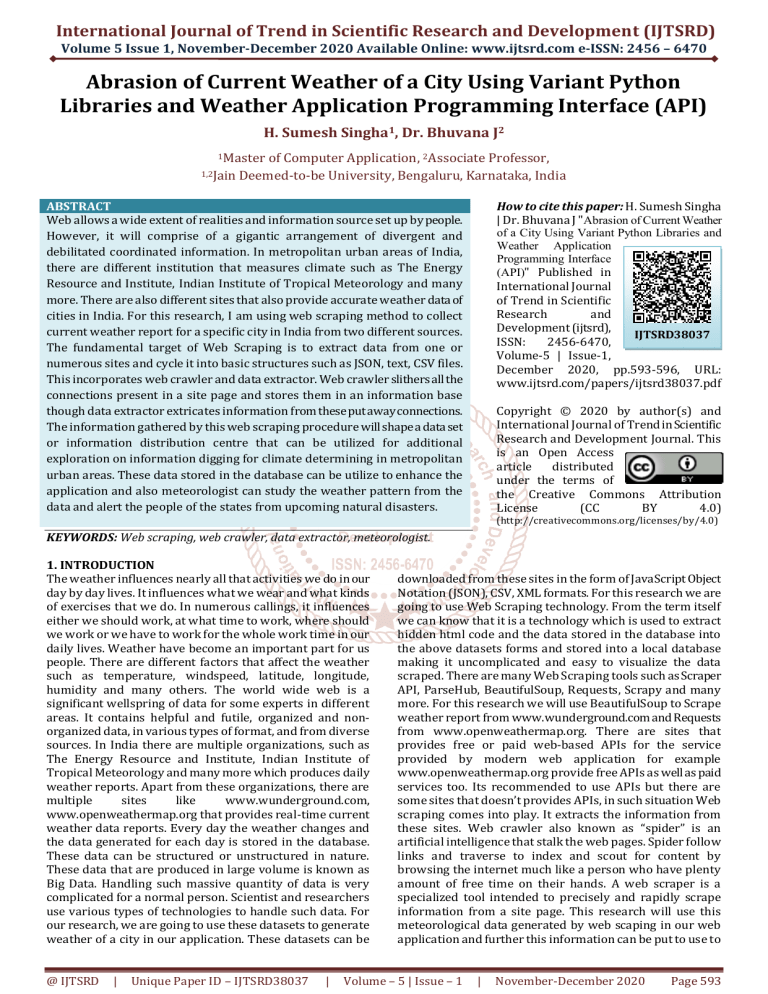
International Journal of Trend in Scientific Research and Development (IJTSRD)
Volume 5 Issue 1, November-December 2020 Available Online: www.ijtsrd.com e-ISSN: 2456 – 6470
Abrasion of Current Weather of a City Using Variant Python
Libraries and Weather Application Programming Interface (API)
H. Sumesh Singha1, Dr. Bhuvana J2
1Master
of Computer Application, 2Associate Professor,
1,2Jain Deemed-to-be University, Bengaluru, Karnataka, India
ABSTRACT
Web allows a wide extent of realities and information source set up by people.
However, it will comprise of a gigantic arrangement of divergent and
debilitated coordinated information. In metropolitan urban areas of India,
there are different institution that measures climate such as The Energy
Resource and Institute, Indian Institute of Tropical Meteorology and many
more. There are also different sites that also provide accurate weather data of
cities in India. For this research, I am using web scraping method to collect
current weather report for a specific city in India from two different sources.
The fundamental target of Web Scraping is to extract data from one or
numerous sites and cycle it into basic structures such as JSON, text, CSV files.
This incorporates web crawler and data extractor. Web crawler slithers all the
connections present in a site page and stores them in an information base
though data extractor extricates information from these put away connections.
The information gathered by this web scraping procedure will shape a data set
or information distribution centre that can be utilized for additional
exploration on information digging for climate determining in metropolitan
urban areas. These data stored in the database can be utilize to enhance the
application and also meteorologist can study the weather pattern from the
data and alert the people of the states from upcoming natural disasters.
How to cite this paper: H. Sumesh Singha
| Dr. Bhuvana J "Abrasion of Current Weather
of a City Using Variant Python Libraries and
Weather Application
Programming Interface
(API)" Published in
International Journal
of Trend in Scientific
Research
and
Development (ijtsrd),
IJTSRD38037
ISSN:
2456-6470,
Volume-5 | Issue-1,
December 2020, pp.593-596, URL:
www.ijtsrd.com/papers/ijtsrd38037.pdf
Copyright © 2020 by author(s) and
International Journal of Trend in Scientific
Research and Development Journal. This
is an Open Access
article
distributed
under the terms of
the Creative Commons Attribution
License
(CC
BY
4.0)
(http://creativecommons.org/licenses/by/4.0)
KEYWORDS: Web scraping, web crawler, data extractor, meteorologist.
1. INTRODUCTION
The weather influences nearly all that activities we do in our
day by day lives. It influences what we wear and what kinds
of exercises that we do. In numerous callings, it influences
either we should work, at what time to work, where should
we work or we have to work for the whole work time in our
daily lives. Weather have become an important part for us
people. There are different factors that affect the weather
such as temperature, windspeed, latitude, longitude,
humidity and many others. The world wide web is a
significant wellspring of data for some experts in different
areas. It contains helpful and futile, organized and nonorganized data, in various types of format, and from diverse
sources. In India there are multiple organizations, such as
The Energy Resource and Institute, Indian Institute of
Tropical Meteorology and many more which produces daily
weather reports. Apart from these organizations, there are
multiple
sites
like
www.wunderground.com,
www.openweathermap.org that provides real-time current
weather data reports. Every day the weather changes and
the data generated for each day is stored in the database.
These data can be structured or unstructured in nature.
These data that are produced in large volume is known as
Big Data. Handling such massive quantity of data is very
complicated for a normal person. Scientist and researchers
use various types of technologies to handle such data. For
our research, we are going to use these datasets to generate
weather of a city in our application. These datasets can be
@ IJTSRD
|
Unique Paper ID – IJTSRD38037
|
downloaded from these sites in the form of JavaScript Object
Notation (JSON), CSV, XML formats. For this research we are
going to use Web Scraping technology. From the term itself
we can know that it is a technology which is used to extract
hidden html code and the data stored in the database into
the above datasets forms and stored into a local database
making it uncomplicated and easy to visualize the data
scraped. There are many Web Scraping tools such as Scraper
API, ParseHub, BeautifulSoup, Requests, Scrapy and many
more. For this research we will use BeautifulSoup to Scrape
weather report from www.wunderground.com and Requests
from www.openweathermap.org. There are sites that
provides free or paid web-based APIs for the service
provided by modern web application for example
www.openweathermap.org provide free APIs as well as paid
services too. Its recommended to use APIs but there are
some sites that doesn’t provides APIs, in such situation Web
scraping comes into play. It extracts the information from
these sites. Web crawler also known as “spider” is an
artificial intelligence that stalk the web pages. Spider follow
links and traverse to index and scout for content by
browsing the internet much like a person who have plenty
amount of free time on their hands. A web scraper is a
specialized tool intended to precisely and rapidly scrape
information from a site page. This research will use this
meteorological data generated by web scaping in our web
application and further this information can be put to use to
Volume – 5 | Issue – 1
|
November-December 2020
Page 593
International Journal of Trend in Scientific Research and Development (IJTSRD) @ www.ijtsrd.com eISSN: 2456-6470
study the weather and climate as well as to enhance the web
application.
2. OVERVIEW OF WEB SCRAPING
Web Scraping, additionally called Web Harvesting, or Web
data extraction is a way towards separating information
from a site. On the off chance that you have ever duplicated
data from a site and glued it into an Excel accounting page or
Word doc then in fact you are scraping a site. Scraping
manually every information from a site is very complicated
and time consuming. Rather than sitting at a PC hitting
Ctrl+C and Ctrl+V for every information you need, you set a
web scraping code running that will separate your ideal
information from the site and store it in your favoured
document design very quickly. Today, web scraping is
utilized in everything from land to web-based business.
From the activity perspective, a web scraping look like
manual reorder task. But there is some variation that is this
task is finished in a coordinated and programmed way, by a
virtual PC specialist. The initial step of web scraping script is
to make a https request to the target website for the data of a
specific URL. This step is accomplished by “Scraper”. Once
the site returns the html file the “scraper” extracts the
information from that HTML file. For this research we are
extracting the current weather report which is accomplished
by a process called “parsing”. The last advance is for the
script to store this information in a CSV excel sheet, JSON or
in an information base so it tends to be utilized physically or
in another program.
Figure 1. Basic architecture of Web Scraping
3. APPLCATIONS OF WEB SCRAPING
Applications of web scraping increases day by day. The
number of applications accessible today is more than it was
yesterday and in future these applications will keep on
increasing. Below there are a-few number of fields where
web scraping is mostly used:
Weather forecasting.
Comparison of prices of different product.
Analysing advertisement.
Web indexing & rank checking
Analysing of graphical datasets.
Optimizing search engines.
Content production.
4. LITERATURE REVIEW
There are many approaches of web scraping. In paper [1]
many different approaches are explained. In this paper i am
going to explain only the basics of those approaches.
@ IJTSRD
|
Unique Paper ID – IJTSRD38037
|
a) Mimicry Approach
In this approach the scrapper is preconfigured with the
location of information gathered from the web page. This
approach is well organized, yet it is less adjusted with
regards to handle different heterogeneous sites.
b) Weight Measurement Approach
This methodology depends on a nonexclusive calculation
which investigations the Document Object Model tree of a
page and measures the heaviness of words in each branch.
c) Differential Approach
This approach explains that the content of the page will vary
only from the body of the web page where both of the page
belongs form the same web page.
d) Machine Learning Approach
The main motive of this approach is to physically examined
sites pages on a huge sample and train an algorithm on it.
Also, paper [1] has explained different categories and tools
for web scraping. Progression of data retrieval have
increased significantly over the period of time. Information
retrieval (IR) was used for web searches even before
internet came into appearance. This IR was common since as
ahead of the schedule as 1960 in business and knowledge
applications. The capacity limit, accuracy, handling force of
IR have dramatically increased over the period of time. Such
turn of events and headway in the field of IR have likewise
brought many changes in the progression of techniques of
querying from the physical library-based approaches. After
the creation of world wide web, the content of pages was
very few and doesn’t need IR to scrape information from
them. Despite the fact that this strategy experiences a
disadvantage of being restricted to thoughtfully homogenous
writings documents permits the archives to be filed by the
manner in which they are referred to in different articles.
The most well-known data recovery is the ad-hoc querying
where a query finds for a bunch of static reports. This
information retrieval technique was used by commercials
search engines like Google and Alta Vista. The downside of
this strategy is that the precision is very low. Agent
paradigm is another type of promising innovation for data
retrieval. IR system became much more scalable, adaptable,
interoperable with the addition of agent in it.
5. PROBLEM STATEMENT
There are multiple web applications that provides real-time
weather report. Obviously, these applications would not
deliver false weather report but still there are some
misbelief whether the weather report is accurate or not. For
this research I am creating a uncomplicated and
straightforward web application for my academic purpose
which will display current weather of a city. My project guide
came with a problem and asked me whether the report
displayed in my application is accurate or not? To overcome
this problem, I came with an idea and thought to build a
script that will scrape weather information from two
different sites.
6. PROPOSED SYSTEM
Different Strategies and tools are used by web scraping
technology to scrape website data and export them into our
local database in the form of JSON, CSV, XML etc. Python
provides different libraries or modules that can be used for
scraping datasets from the HTML web documents such as
Volume – 5 | Issue – 1
|
November-December 2020
Page 594
International Journal of Trend in Scientific Research and Development (IJTSRD) @ www.ijtsrd.com eISSN: 2456-6470
Requests, BeautifulSoup, Scrapy, Selenium. To overcome the
problem of my project guide my application will use
Requests to make an API call to www.openweathermap.org
and display the report in the web application whereas
BeautifulSoup
will
scrape
HTML
page
from
www.wunderground.com and exhibits the topical weather
temperature of a city on the console. This application is
created only for academic purpose. This application will
show temperature in a graphical representation along with
the other weather factors like windspeed, humidity weather
description any many more also it has a very simple user
interface with only a text field to enter the city name and
search button. This application will be deployed on a cloud
service i.e. www.pythonanywhere.com which provides
three months trail hosting service for your web-based
python application. This cloud service is fully automated,
easy and Simple to use.
8. SEQUENCE DIAGRAM
Figure 3. Sequence Diagram
9. MODULE DIAGRAM
Figure 2. Proposed System Architecture
7. METHODOLOGY
BeautifulSoup is one of the important python libraries which
is used to handle XML, HTML and other types of mark-up
languages. Whereas Requests library is used to send HTTPs
request without the need of manually querying string to the
URL. Inside the request there is a module urllib3 which keepalive the URL and allows constant polling of data. Following
principles are followed to run the application:
Figure 4. Module Diagram
First the application is accessed by a web browser.
Then we need to entered the city name for the weather
report.
10. RESULTS
After that the script sends a Https Get request to the
targeted site(www.openweathermap.org) using the
request module.
Next the Scripts check whether the city exist in the
world or not from the database server. Depending on
the city existence a successful or error memo is flashed
on the application.
Figure 5. Running the Application on Localhost
Similarly, Beautifulsoup parse the weather temperature
from the target site(www.wunderground.com) which is
a HTML page and display it in the console.
If any updates are required then a POST request is send
using the Python requests module.
Figure 6. Weather Report of a City (from
www.openweathermap.org)
@ IJTSRD
|
Unique Paper ID – IJTSRD38037
|
Volume – 5 | Issue – 1
|
November-December 2020
Page 595
International Journal of Trend in Scientific Research and Development (IJTSRD) @ www.ijtsrd.com eISSN: 2456-6470
they can take required precautions and safety measures.
Also, this will help farmers to decide whether the weather is
suitable for planting, watering, and other harvesting
activities.
REFERENCE
[1] R. DIOUF, E. N. SARR, O. SALL, B. BIRREGAH, M.
BOUSSO and S. N. MBAYE, "Web Scraping: State-ofthe-Art and Areas of Application," IEEE International
Conference on Big Data (Big Data), pp. 6040-6042,
2019.
Figure 7. Cities names in the Database
Figure 8. Error Message of Invalid City
Figure 9. weather report of a city (from
www.wunderground.com)
11. CONCLUSION AND FUTURE ENHANCEMENT
With the help of this application generating current weather
reports become much easier. With minimalistic user
interface anyone can use this application and observe the
current weather of their city. There are very few chances for
this application to malfunction as it used APIs for generating
the weather report. In future the database can be modified to
stored not only the names of the cities but also the weather
factors that affect the climate. Using that data, meteorologist
can study the weather pattern and generate report for
upcoming weeks, months and years. This will help to alert
people about the natural disasters at an early stage so that
@ IJTSRD
|
Unique Paper ID – IJTSRD38037
|
[2]
F. Y. N. Kunang and S. . D. Purnamasari, "Web Scraping
Techniques to Collect Weather Data in South
Sumatera," INTERNATIONAL CONFERENCE ON
ELECTRICAL ENGINEERING AND COMPUTER
SCIENCE (ICECOS), 2018.
[3]
M. S. Parvez, S. S. Rajendra, K. S. A. Tasneem and K. R.
Bodke, "Analysis Of Different Web Data Extraction
Techniques," International Conference on Smart City
and Emerging Technology (ICSCET), Mumbai, 2018.
[4]
P. Ashiwal, S. R. Tandan, P. Tripathi and R. Miri , "Web
Information
Retrieval
Using
Python
and
BeautifulSoup," International Journal for Research in
Applied Science & Engineering Technology (IJRASET),
pp. 335-339, 2016.
[5]
S. Singh and R. Jain, "Weather report on metropolitan
cities in India using web scraping technique,"
International Journal of Advance Research, Ideas and
Innovations in Technology, pp. 1068-1070, 2019.
[6]
A. V. Saurkar , K. G. Pathare and S. G. Gode, "An
Overview On Web Scraping Techniques And Tools,"
International Journal on Future Revolution in
Computer Science & Communication Engineering , pp.
363-367, 2018.
[7]
B. G. Dastidar, D. Banerjee and S. Sengupta, "An
Intelligent Survey of Personalized Information
Retrieval using Web Scraper," I.J. Education and
Management Engineering, 2016.
[8]
R. Samya and R. Rathipriya, "Predictive Analysis for
Weather Prediction using Data Mining with ANN: A
Study," International Journal of Computational
Intelligence and Informatics, pp. 150-154, 2016.
[9]
D. Karthikeyan and M. Shivaranjani, "A Review of
Weather Forecasting Using Data Mining Techniques,"
International Journal Of Engineering And Computer
Science, pp. 19784-19788, 2016.
[10]
V. Singrodia, A. Mitra and S. Paul, "A Review on Web
Scrapping and its Applications," International
Conference on Computer Communication and
Informatics (ICCCI -2019), 2019.
Volume – 5 | Issue – 1
|
November-December 2020
Page 596

